

9 Tips To Apply Adult Learning Theory to eLearning. In this article I'll discuss how Knowles' 5 adult learning theory assumptions can be translated to modern day eLearning experiences, so that you can integrate the 4 principles of Andragogy into your eLearning course for maximum learner engagement and motivation. According to the renowned American educator, Malcolm Knowles there are 5 assumptions concerning the characteristics of adult learners, and 4 principles concerning adult learning (andragogy). Despite the fact that Knowles' adult learning theory assumptions and principles were introduced in the 1980's, each can be utilized today to help eLearning professionals create more meaningful learning experiences for adult learners. Applying Knowles’ 5 Adult Learning Theory Assumptions to eLearning Applying Knowles’ 4 Adult Learning Theory Principles to eLearning Principle of Andragogy#1Adults must have a hand in the design and development of their learning experience.
Humanizing Your Online Class. Massive Open Online Courses Are Multiplying at a Rapid Pace. MOOCs have been around for a few years as collaborative techie learning events, but this is the year everyone wants in.
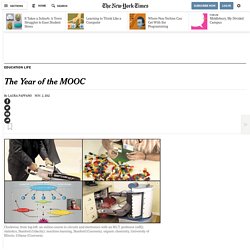
Elite universities are partnering with Coursera at a furious pace. It now offers courses from 33 of the biggest names in postsecondary education, including Princeton, Brown, Columbia and Duke. In September, Google unleashed a MOOC-building online tool, and Stanford unveiled Class2Go with two courses. Nick McKeown is teaching one of them, on computer networking, with Philip Levis (the one with a shock of magenta hair in the introductory video). Dr. “We are just going to see how this goes over the next few weeks,” says Dr. Traditional online courses charge tuition, carry credit and limit enrollment to a few dozen to ensure interaction with instructors.
Because anyone with an Internet connection can enroll, faculty can’t possibly respond to students individually. The evolving form knits together education, entertainment (think gaming) and social networking. Mr. Dr. Dr. Online-3rd-Party-Tools. The MOOC Misnomer. MOOC = Massive Open Online Course There are a number of reasons why the term MOOC is a misnomer. - Many MOOCs are massive but not open (e.g., - Many MOOCs are open but not massive (e.g.
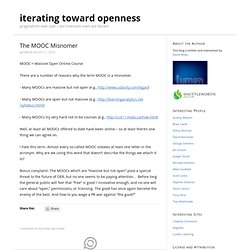
Teaching Commons. What is a MOOC?
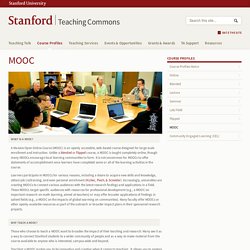
A Massive Open Online Course (MOOC) is an openly accessible, web-based course designed for large-scale enrollment and instruction. Unlike a blended or flipped course, a MOOC is taught completely online, though many MOOCs encourage local learning communities to form. Report-11-strategies-for-managing-online-courses1.pdf. Instructional Design Models. The following is a list of prescriptive instructional design models. Prescriptive models provide guidelines or frameworks to organize and structure the process of creating instructional activities.
These models can be used to guide your approach to the art or science (your choice) of instructional design. Dieter Rams' 10 principles of good web design. "My heart belongs to the details.

I actually always found them to be more important than the big picture. Nothing works without details. They are everything, the baseline of quality" – Dieter Rams Since I got to know the work of Dieter Rams back in art college, I became fascinated by the exceptional products that he made for Braun from the 1950s onwards. Annenberg Learner - Teacher Professional Development. Saylor Academy.
OpenStax College. Online Textbooks, eTextbooks @Flat_World Knowledge. HippoCampus - Homework and Study Help - Free help with your algebra, biology, environmental science, American government, US history, physics and religion homework. Tech Tools Featured in T4LT - Google Sheets. Is there a Future for e-textbooks in Online Courses? What is the future of Digital Textbooks in U.S. education?
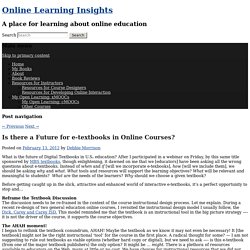
After I participated in a webinar on Friday, by this same title sponsored by MBS textbooks, though enlightening, it dawned on me that we [educators] have been asking all the wrong questions about e-textbooks. Instead of when and if [will we incorporate e-texbooks], how [will we include them], we should be asking why and what. What tools and resources will support the learning objectives? What will be relevant and meaningful to students?
What are the needs of the learners? Before getting caught up in the slick, attractive and enhanced world of interactive e-textbooks, it’s a perfect opportunity to stop and… Technology for Learners and Teachers. For Many Students, Print Is Still King - Technology. Despite the hype about e-books, the classic textbook hasn't gone away.
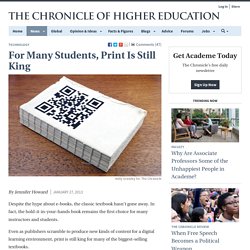
In fact, the hold-it-in-your-hands book remains the first choice for many instructors and students. Even as publishers scramble to produce new kinds of content for a digital learning environment, print is still king for many of the biggest-selling textbooks. Take the familiar Norton Anthology of English Literature, which celebrated its 50th anniversary this past year. Norton doesn't even offer an electronic version, but the book is going strong in its ninth edition. Its success has spawned a long line of Norton anthologies, devoted to American literature, African-American literature, children's literature, Latino literature, and more. Collectively the anthologies have sold more than 15 million copies, says Julia A.
That doesn't mean that Norton has ignored the Web or the current push in educational publishing to deliver online assessment tools and tutorials along with textbooks. The 'Comfort' of Print Julie K. The No-textbook Challenge: Using web resources to replace the College Text. Is it possible to use Open Educational Resources and other open education materials to replace student textbooks for an online college course?
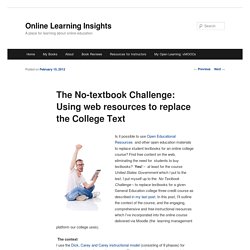
Find free content on the web, eliminating the need for students to buy textbooks? Yes! – at least for the course United States Government which I put to the test. I put myself up to the No Textbook Challenge – to replace textbooks for a given General Education college three credit course as described in my last post. In this post, I’ll outline the context of the course, and the engaging, comprehensive and free instructional resources which I’ve incorporated into the online course delivered via Moodle (the learning management platform our college uses).